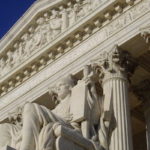Published February 27, 2012
(The two posts below were published on NRO’s Bench Memos blog on February 27, 2012.)
Inept NYT Op-Ed Defending HHS Mandate-Part 1
Sunday’s New York Times featured an utterly incompetent op-ed by Dorothy Samuels—a member of the NYT editorial board—contending that the “legal case against the [HHS contraception mandate] is remarkably weak.” But what is “remarkably weak” is Samuels’s grasp of the relevant principles of religious freedom that she undertakes to present:
1. Samuels contends that the HHS mandate does not trigger the protections of the Religious Freedom Restoration Act because the mandate “does not interfere with a religious practice or ceremony.” The mandate, she asserts, “is no impediment to the exercise of religion,” for it “does not interfere with church governance, prevent anyone from voicing opposition, or force anyone to use contraceptives in violation of religious beliefs.”
Samuels’s contention is a jumble of confusion. She’s trying to advance a very narrow concept of the “exercise of religion” protected by RFRA, but she can’t even sort out what she thinks is the limiting principle. First, she seems to limit the “exercise of religion” to “religious practice or ceremony,” but then she expands the concept to encompass “church governance” and to not being “force[d] … to use contraceptives in violation of religious belief.”
As I have explained, a person engages in an “exercise of religion” under RFRA when, for religious reasons, he performs, or abstains from performing, certain actions. In the text of RFRA itself, Congress cited the landmark Free Exercise cases of Sherbert v. Verner (1963) and Wisconsin v. Yoder (1972), which set forth the standard of scrutiny that RFRA restores as a matter of federal statutory law. In Sherbert, an individual’s religious beliefs forbade her from working on Saturdays. In Yoder, the parents of teenaged children had religious beliefs that prohibited them from sending their children to high school. So neither case involved “religious practice or ceremony” or “church governance.” Nor has any RFRA case imposed such a narrow reading of “exercise of religion.”
Samuels seems not to grasp that her apparent recognition that RFRA applies when a person is “force[d] … to use contraceptives in violation of religious belief” reflects the broader principle that RFRA applies any time a person is forced to take any action in violation of that person’s religious belief.* (To be clear: In saying that RFRA “applies,” I am maintaining only that RFRA’s standard needs to be satisfied-the point Samuels denies-not that the person’s RFRA challenge will necessarily succeed.) So Samuels is flatly wrong to maintain that a person is not engaged in an “exercise of religion” for purposes of RFRA when that person, for religious reasons, refuses to provide health insurance that covers contraceptives and abortifacients.
2. Samuels’s argument that the HHS mandate can pass RFRA’s strict scrutiny is laughable. Samuels asserts that the HHS mandate “clearly advances the government’s compelling interest in promoting women’s health and autonomy, and broad participation is the least restrictive way to carry out a complicated national health reform.”
Let’s start with the latter first. The question under the “least restrictive means” prong of RFRA is whether the HHS mandate increases access to contraceptives via the means that is least restrictive of the religious liberty of the objecting employer. The obvious answer to that question, as I have explained, is no: There are plenty of means by which the government could provide contraceptives directly, and the Obama administration’s decision instead to dragoon the objecting employer is among the means most restrictive of the employer’s religious liberty.
Rather than confront this argument, Samuels makes the unintelligible assertion that “broad participation is the least restrictive way to carry out a complicated national health reform.” Her statement gives no hint that she even understands that the focus of the “least restrictive means” test is on the religious liberty of the objecting person.
Because the HHS mandate can’t possibly pass the “least restrictive means” test, it flunks RFRA. But as I explain here, the HHS mandate also can’t pass the “in furtherance of a compelling governmental interest” prong of RFRA. Samuels’s conclusory assertion provides no response to the points I have made. (See here for a one-stop collection of my posts on the HHS mandate and RFRA.)
3. Samuels also makes a superficial argument that the HHS mandate doesn’t violate the Free Exercise Clause, as interpreted in Employment Division v. Smith. (In fairness to Samuels, I will note that many of the assertions that the HHS mandate does violate the Free Exercise Clause are equally superficial and fail to take account of Smith.)
What Samuels fails to recognize is that the exclusion of a broad swath of employers from the mandate for secular reasons—e.g., the employers who have so-called “grandfathered plans” and small employers (see points developed here, in the context of RFRA’s “compelling interest” standard)—means that the mandate isn’t neutral and generally applicable. (As the Sixth Circuit recently explained, a law is not neutral and generally applicable if it “permit[s] secular exemptions but not religious ones.” See also the Third Circuit opinion by then-Judge Alito that I discuss here.) The mandate is therefore subject to the same test under the Free Exercise Clause that it faces under RFRA, and it flunks that test for the same reasons.
* On review (5-6 p.m.), I’ve tweaked this sentence to make it more clear.
Inept NYT Op-Ed Defending HHS Mandate-Part 2
Dorothy Samuels’s legally inept op-ed defending the HHS mandate is replete with other distortions. To cite a few:
1. Samuels c
ontends that Catholic bishops are making a “specious claim to impose their religious views on millions of Americans who do not share them” and “[i]n essence … are arguing that they are above the law and their beliefs should be elevated over pressing societal interests.”
That’s nonsense. What Catholic bishops are making is a claim that they and other objecting religious employers shouldn’t be dragooned to violate their own religious convictions. There is no good reason why the government can’t pursue its interest in marginally increasing contraceptive access without conscripting objecting religious employers. Far from “arguing that they are above the law,” those making this claim are defending their actual legal rights under RFRA and the Free Exercise Clause and the broader tradition of religious liberty that Samuels seems so eager to trample.
2. Like many defenders of the HHS mandate, Samuels asserts that the “original rule … exempted churches, mosques, and other houses of worship.” That’s simply not true. The so-called “original rule,” which is the rule that HHS formalized as a final rule on the very day that the White House announced its intention to tweak the rule at some point down the road, provides that a religious employer will be eligible for the exemption only if it
(1) Has the inculcation of religious values as its purpose; (2) primarily employs persons who share its religious tenets; (3) primarily serves persons who share its religious tenets; and (4) is a non-profit organization described in section 6033(a)(1) and section 6033(a)(3)(A)(i) or (iii) of the Code.
What reason is there to believe that a house of worship that, say, provides shelter to the homeless and English language classes to immigrants or that hires lots of staffers irrespective of their religious beliefs would be deemed to satisfy this test? There simply is no blanket exemption even for “churches, mosques, and other houses of worship.”
3. Samuels also claims that the Obama administration “has revised its original rule … and now also relieves colleges, hospitals, charities, and other religiously affiliated groups from having to provide contraceptive coverage directly.” She claims that this supposed revision makes the mandate less vulnerable to legal attack. She’s wrong in multiple respects:
a. No actual revision has yet been made. Just vague promises evidently designed to defuse the controversy until after the election.
b. Samuels contends that the proposed revision would “put the burden on insurance companies to offer contraceptives free of charge.” But how that would happen, without the insurance companies charging a premium that requires the objecting employers to pay for the contraceptives, remains a mystery. Nor is it evident what legal authority the Obama administration would have to impose such an obligation.
c. The many entities that self-insure, like EWTN (one of the plaintiffs challenging the HHS mandate), wouldn’t benefit from this proposed revision.
d. There is no reason to think that the proposed tweak materially affects the religious objection that the employers have to facilitating the provision of contraceptives, abortifacients, and sterilization services to their employees. Exactly as with the original mandate, once an employer selects an insurance company to provide coverage to its employees, that insurance company will provide coverage of objectionable services to those employees. The employer who objects on religious grounds to providing coverage of those services is still being compelled to do exactly that.
e. Even if the tweak were meaningful, it would extend only to some as-yet-undefined category of nonprofit religious organizations. It does nothing to respect the religious freedom of other employers.
4. Samuels contends that the legislative relief that opponents of the HHS mandate are seeking “is an outrageous assault on the First Amendment.” But it’s the Obama administration’s attack on the legitimate rights of objectors under the Free Exercise Clause (as well as RFRA)—and Samuels’s support of that attack—that is the “outrageous assault.”
Edward Whelan is president of the Ethics and Public Policy Center and is a regular contributor to NRO’s Bench Memos blog.








